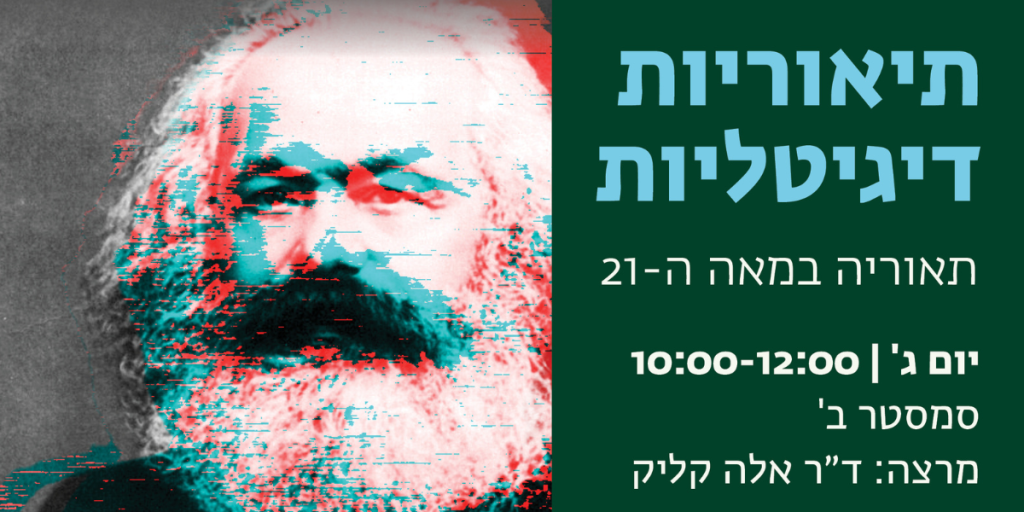תיאוריות דיגיטליות

תיאוריות דיגיטליות | Digital Theories
ד״ר אלה קליק
ימי ג׳, 10:00-12:00
מה מקנה הקורס?
- היכרות עם פילוסופים מרכזיים של המאה ה-20
- הבנה של ההשפעה החברתית והתרבותית של הטכנולוגיה הדיגיטלית על החברה
- פירוק הממדים הפוליטיים, הכלכליים והאתיים של העת הדיגיטלית
- חשיבה על איך מדיה דיגיטלית מעצבת את המפגש שלנו עם העולם וזה עם זה
- יישום תיאוריות דיגיטלית כדי להבין טוב יותר מקרי בוחן ואובייקטים לבחירתך
תקציר הקורס
הקורס תיאוריות דיגיטליות חוקר מסגרות, פרדיגמות והנחות שונות העומדות בבסיס קריאות ביקורתיות של טכנולוגיות עכשוויות וספקולטיביות. הקורס יתקדם בקו השוואתי ויעריך את האפשרויות והמגבלות של התבססות על פילוסופים קונטיננטליים מקארל מרקס ומרטין היידגר ועד מישל סר כדי לנתח ולהבין את הרגע הנוכחי. נשאל האם התיאוריות המרכזיות של המאה ה-20 עדיין רלוונטיות לחקר סוגיות שונות בהווה, במיוחד כשבמרכזן הטכנולוגיות הדיגיטליות. על ידי שימוש בגישה השוואתית, הפגישות יעסקו בשאלות אתיות, חברתיות ופוליטיות תוך מתן תשומת לב מיוחדת לנושאים כגון אוטומציה, מהות, מעקב וכו'. בסוף הקורס הסטודנטים יפיקו עבודת מחקר שתוגש לכנס בתחומם.
לסילבוס המלא
שיעורים לדוגמה:
המרחב הוירטואלי וא-חומריות // זיכרון = ארכיון ? // עתיד העבודה ואוטומציה // מעקב // הדבר // קיברנטיקה, מסר, רעש // צורות ריזומתיות // ייצור גנרטיבי ואוטומציה // תודעה מלאכותית
ביבליוגרפיה:
Philip E. Agre, “Surveillance and capture: Two models of privacy,” The New Media Reader (MIT Press: 2003). 737-760.
Belinda Barnet, “Pack-rat or Amnesiac? Memory, the archive and the birth of the Internet,” Continuum: Journal of Media & Cultural Studies 15, no.2 (2001): 217-231.
Aaron Bastani, “What Is Fully Automated Luxury Communism?” in Fully automated luxury communism (Verso Books, 2019), 50-93.
David W Bates, An Artificial History of Natural Intelligence: Thinking with Machines from Descartes to the Digital Age (University of Chicago Press, 2024). Short selections.
Jeremy Bentham, “Letters I, II, V, VI,” in The Panopticon Writings (London: Verso, 1995).
Gilles Deleuze and Felix Guattari, A Thousand Plateaus (University of Minnesota Press, 1987), selections.
Douglas-Jones, R. C., and Salla Sariola. "Rhizome yourself: experiencing Deleuze and Guattari from theory to practice." Rhizomes cultural studies in emerging knowledge 19, no. Summer (2009).
Hubert Dreyfus, What Computers Can’t Do: The Limits of Artificial Intelligence. (Harper & Row, 1972). Selections.
Sigmund Freud, “Notes on a mystic writing pad,” The Standard Edition of the Complete Psychological Works of Sigmund Freud Vol. 19 (1925): 227-232.
Alexander Galloway, “Afterword: A note on method,” in Uncomputable: play and politics in the long digital age (Verso Books, 2021), 247-259.
Martin Heidegger, “The Thing,” in Poetry Language, Thought (Harper & Row, 1971), 163-175.
Michael Heim, "The erotic ontology of cyberspace," Cyberspace: first steps (1991): 59-80.
Bruno Latour, “Why has critique run out of steam? From matters of fact to matters of concern,” Critical Inquiry 30, no. 2 (2004): 225-248.
Karl Marx, “Chapter 15: Machinery and Large-Scale Industry (sections 1-4),” Capital Vol. 1.
Rosa Menkman, The glitch moment(um) (Institute of Network Cultures, 2011), 12-33.
Plato. Lysis; Symposium; Phaedrus (Harvard University Press, 2022). Short selections.
Antoinette Rouvroy, “The end(s) of critique: Data behaviorism versus due process,” in Privacy, Due Process and the Computational Turn (Routledge, 2013).
Claude Shannon and Warren Weaver, “A mathematical model of communication,” in Information: A Reader (Chicago University Press: 2022), 20-29.
תאריך עדכון אחרון : 19/02/2025



